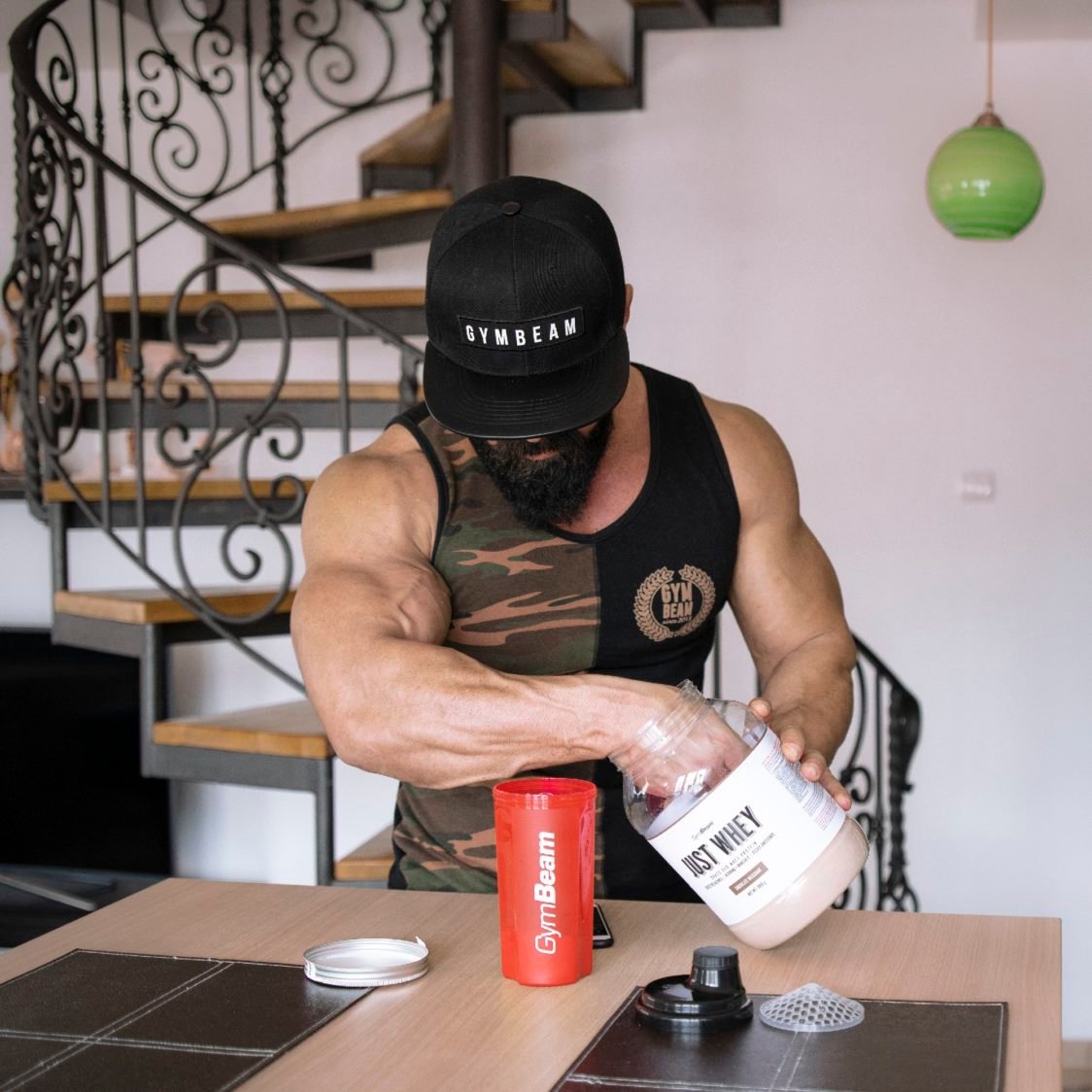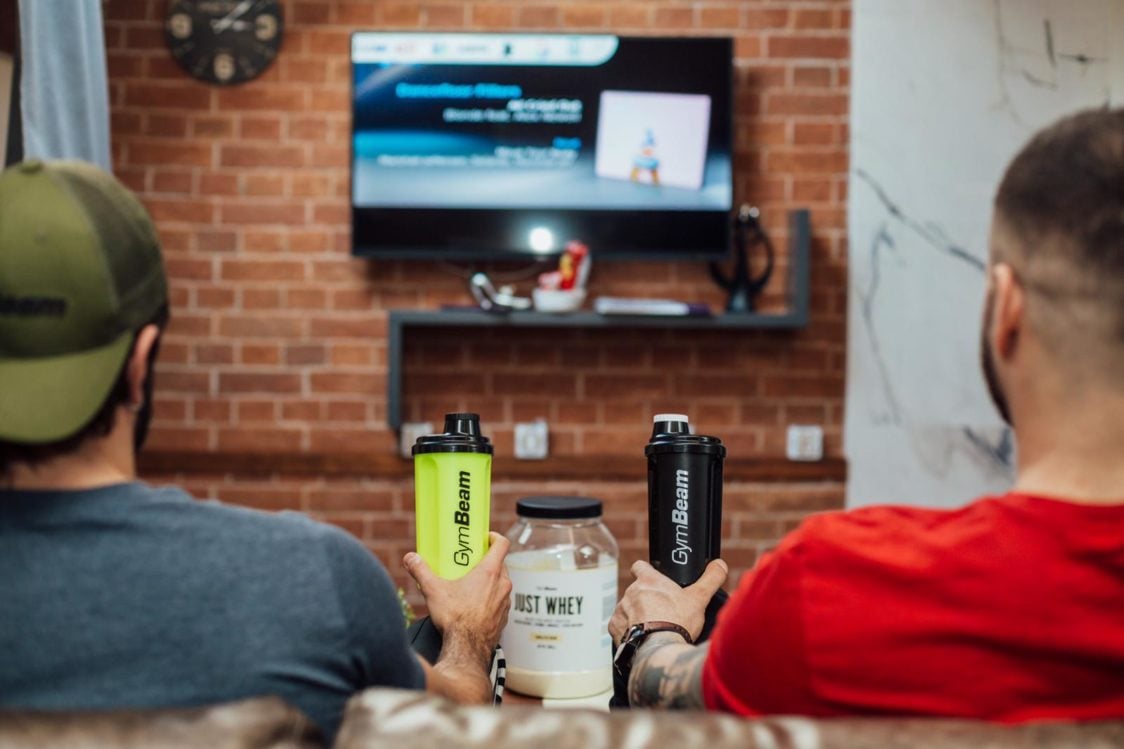Table of Contents
Do you feel that your friends’ metabolism works better than yours? One cannot fully influence this process, but there are ways to “push” the speed a bit. You can start it even by drinking half a liter of water. Read the article on metabolism and ways to speed it up.
Metabolism – the transformation of substances in the body
Chemical processes take place in the body almost constantly. Even though we don’t realize it, our body works to enable us to function properly. The term metabolism refers to biochemical processes the task of which is to “keep us alive”. You will often encounter a division of reactions into anabolic and catabolic. In anabolic reactions, the body uses energy from catabolic processes to create cellular structures from smaller building blocks. An example is the formation of proteins from amino acids. Conversely, in catabolism, larger molecules are broken down into smaller ones in order to obtain energy. Catabolic reactions include the breakdown of food during digestion. Metabolism is very complex, it is important for health that the reactions take place correctly, because the rate of metabolism is also reflected in our weight. [1] [2] [3]
The body needs energy to function, and its minimum to maintain biochemical processes is called the rate of basal metabolism. These are the calories needed for the most basic processes, such as breathing, circulatory function, or food processing. It depends on your age and lifestyle, but the rate of basal metabolism is about 40-70% of your daily energy needs. [16] [17]
Do you want to calculate your basal metabolic rate and daily energy expenditure? See our article – How to calculate basal metabolic rate and daily energy consumption?
In general, a “larger” body needs more energy to function. When we compare the need for energy, muscles need more than fat, and therefore people with a higher proportion of muscle have a faster metabolism. Therefore, beware of drastic diets, in which you force the body to use energy from the muscles. Muscle loss will also slow down your metabolism. Maintaining and building muscle through lifestyle and exercise is an effective way to control the rate of metabolism at least partially. [16]

Slower metabolism
Metabolism changes over life, due to lifestyle, but naturally also slows down with age. You do not believe it? Maybe you are already at an age when you only remember with nostalgia how much you could have eaten some time ago, without gaining any weight. Metabolism is the key to maintaining weight, so slowing it down will logically make you gain more weight. [4] [5]
Metabolism slows down with age, and according to research, this is mainly due to muscle loss and reduced activity. Mitochondria and sodium-potassium pumps are parts of the cell the function of which also decreases with age, but they do not have as much effect on metabolism as activity and muscle loss. One of the functions of mitochondria is the production of energy, and the role of sodium-potassium pumps is to move sodium and potassium ions across the cell membrane. Although the processes slow down with age, it somehow logically follows that a person naturally gains weight with age, but to a certain extent we can influence it. [4] [6] [7]

There can be several reasons for slower metabolism, including our genetic equipment. It is not just a myth or a simple excuse. Researchers at Cambridge University have indeed discovered a gene that may be responsible for slower metabolic activity and overweight. The belief that obesity may be related to genes is older, but only now has a real gene been identified. It is called KSR2 and according to researchers, its mutation may reduce the ability of cells to metabolize glucose and fatty acids. This discovery is not just an official excuse for overweight people. In the future, we may see the use of the gene for medical purposes and the treatment of obesity. [13] [14]
In addition to genetics, hormones, various medicines, lack of sleep, stress or hydration can also cause a slower metabolism. The question remains whether it is possible to speed up the metabolism to make it work according to our ideas, and the answer is – to a certain extent. Unfortunately, you can’t “move” with genetics, but you can support its speed with changes in your lifestyle, for example by training, proper diet or hydration. In addition to the general framework, there are specific habits that will help your metabolism start better. [13] [15]
How to speed up metabolism?
To some extent, we have control over metabolism, even though it slows down with age. We have selected a few ways for you to help your metabolism function properly.
Metabolism and exercise
Exercise and overall physical activity need to be put first in metabolism, as this is one of the key ways to speed it up. Muscles burn more calories than fat stores, even after a workout is over. This is due to EPOC (excess post-exercise oxygen consumption), thanks to which your metabolism will remain faster even a few hours after exercise. It is the amount of oxygen needed to restore the body and is used, for example, to replenish oxygen in blood vessels and muscles, repair muscles after training or restore body temperature. The body needs about 5 calories to consume 1 liter of oxygen,increasing the amount of oxygen consumed during and after exercise will naturally increase the number of calories burned. The body needs not only energy for training, but also for subsequent recovery, and this must not be forgotten. [18] [19] [20]

You can exercise in different ways and you are definitely wondering if it is better to prefer cardio or strength training. The truth is that both are useful,and it would be ideal to have both aerobic and anaerobic training. Whether you prefer running or group exercise, the more intense your aerobic training, the more you burn. With a 30-minute jog, you will burn about 250 calories, at the same time during strength training you will burn only about 130 – 220 calories. So, during one training, you burn more calories by doing cardio. On the other hand, after strength training, the metabolism can be in the “accelerated mode” for another 38 hours, which is definitely not to be ignored. According to a 2001 study, weight training led to an increase in “resting” metabolism of 9% in men and 4% in women. Progress is more pronounced in men, but even 4% are not pointless. Younger and older respondents of both sexes were among the applicants, and at the end of the study the authors stated that changes in the absolute and relative rates of resting metabolism were influenced by gender, not age. [18] [21] [22] [23]
Although you can burn more calories with cardio, strength training will keep the “higher rate” of metabolism longer, while supporting muscle growth and maintenance. Whether aerobic or anaerobic, both affect our metabolism, fat burning and body formation. The number of calories burned during the day can support the activity, and it would be ideal to find time for regular cardio as well as strength training. In addition to purposeful time on a treadmill or with dumbbells, common activities are also beneficial, such as ignoring elevators and escalators, or walking to the store. Surely you have heard the common saying – they are thin because they have fast metabolism. Maybe genetics really gave someone a faster metabolism, but maybe it’s a more active person during the day. [16] [21]
Sufficient protein intake
Proteins have a higher thermal effect than carbohydrates or fats. This means that you will burn more calories when consuming them. By consuming proteins from the diet or in form of nutritional supplements, you will supplement their amount, which will also support metabolism. According to a 2008 study, a daily intake of 25-30% of calories from protein can increase metabolism per day by up to 80-100 calories. You can therefore support your metabolism by choosing a diet with a higher protein content. [4] [5] [8]
If you are interested in the effect of proteins on weight loss, read the article – Proteins and weight loss: how do proteins affect weight loss?

Vitamins and minerals to support metabolism
Not only proteins help to start metabolism, and thus burn calories better. Vitamins and minerals also have a role to play, which you should definitely not forget. Here are some examples [9] [10] [11] [12]:
- B-group vitamins – you may know them by names, such as niacin, biotin, or thiamine, or by number, such as Vitamins B1, B2, B3, B5, B6, B7, B9 or B12. They are present in several processes in the body, including metabolism. You can find them in meat, fruits, vegetables and nuts, or in the B-complex and other supplements.
- Vitamin D – we take it when staying in the sun, but we also find it in the diet and supplements. According to scientists, it could be beneficial in regulating blood sugar and improving insulin resistance in patients with diabetes. Not only for metabolism, but overall health, it is right to maintain a sufficient amount of vitamin D. Supplementing vitamin D will support your immunity, bones or cognitive function.
- Magnesium – the deficiency of magnesium is unfortunately common in today’s world, which can lead to problems with nerves, blood pressureor insulin sensitivity. It is important for maintaining proper metabolism and can be found in bananas, spinach, or whole grains.
- Iron – we need it for oxygen transfer in blood cells, cell function, but also metabolism. Its low level means that not enough oxygen gets into the muscles and there is insufficient burning of fat as fuel. Iron is found in meat, legumes, or nuts.
- Calcium – is generally known for the benefits associated with healthy bones, but in addition it is useful for healthy metabolism and blood sugar levels. Almost all calcium is found in bones and teeth, but it is also important for muscles and the nervous system. A research from 2010 suggests that higher doses of calcium with vitamin D may have a positive effect on weight loss. Its sources are dairy products, but also broccoli, kale, and most cereals.
You might be interested in these products:
Metabolism and fluid intake
The human body is largely made up of water and hydration is essential for life. According to several studies, drinking fluids is also useful for our metabolism. You may not think of it, but one of the reasons is the heating of the drunk water in the body. A 2003 study examined energy expenditure after drinking 500 ml of water. According to the article, the metabolic rate increased by 30%, with maximum values occurring after 30-40 minutes and a thermogenesis value of 100 kJ. And exactly 40% of energy was used to heat the water in the body from 22 to 37 °C. 100 kJ is not 100 calories and for some it may be a negligible amount, but on the other hand it is great that we can support the metabolism with such a normal and undemanding activity. Not to forget, drinking water is also useful for feeling full, and according to research, a person eats less if he drinks 30 minutes before a meal. [24] [25] [26]

We are not only talking about drinking clean water, but also coffee and tea are among the drinks to support metabolism. Green tea can be a great alternative if you are not a fan of drinking clean water. According to research, the content of catechins and caffeine in tea can start metabolism, and even oolong or green tea will help improve the use of fat stores as energy. For the sake of objectivity, it should be added that there is also research that demonstrates the zero effect of these teas on metabolism. Its impact can be minimal, but at the same time a pleasant added value for green tea lovers. Do you prefer coffee? Coffee also has a benefit for metabolism. Six different studies have confirmed that coffee lovers who drink 3 coffees a dayburn 100 more calories a day. This is probably not a reason to increase daily doses of caffeine, but it is a nice bonus for people who cannot imagine their morning without coffee. [24] [26] [27]
Would you like to know more about the benefits of green tea? You will find everything important in the article – 8 positive effects of Green Tea on the health of athletes.
Other ways to support metabolism
The effects of training, hydration or green tea may vary because the metabolism of each of us works differently. In addition, we list other potential ways to help your metabolism [24] [26] [27] [28]:
- Chili and spices – ginger or chili peppers containing capsaicin can help kick metabolism
- Eating at regular intervals – a long period without food can slow down calorie burning. Regularity is beneficial for the body; it does not hurt to consume small courses every 3-4 hours.
- Energy drinks – contain caffeine and some also taurine, an amino acid with a potential effect on fat burning. Keep in mind, however, that in addition to caffeine, you will often find high sugar content in them.
- Remember to sleep – lack of rest “scatters” levels of ghrelin (a hormone of hunger) and leptin (a hormone of satiety), which can prevent overeating. Being active is great, but adequate rest is also beneficial.
Metabolism changes during life and we do not have a full influence on its rate, but we can influence its activity by physical activity, diet, and other factors. Metabolism changes with age, which is another reason why efforts to improve it are justified. Are you interested in the topic of speeding up your metabolism and you want your friends to know about it as well? Feel free to support the article by sharing.
[1] Tim Newman - Myths and facts about metabolism - https://www.medicalnewstoday.com/articles/8871
[2] Ananya Mandal - What is Anabolism? - https://www.news-medical.net/life-sciences/What-is-Anabolism.aspx
[3] Ashley Marcin - Catabolism vs. Anabolism: What’s the Difference? - https://www.healthline.com/health/catabolism-vs-anabolism
[4] Ryan Raman - Why Your Metabolism Slows Down With Age - https://www.healthline.com/nutrition/metabolism-and-age
[5] Franziska Spritzler - 6 Mistakes That Slow Down Your Metabolism - https://www.healthline.com/nutrition/6-mistakes-that-slow-metabolism
[6] Sodium-potassium pump - https://www.neuroscientificallychallenged.com/glossary/sodium-potassium-pump
[7] Tim Newman - What are mitochondria? - https://www.medicalnewstoday.com/articles/320875#function
[8] Margriet S Westerterp-Plantenga - Protein intake and energy balance - https://pubmed.ncbi.nlm.nih.gov/18448177/
[9] Cathleen Crichton-Stuart - Vitamins and minerals that boost metabolism - https://www.medicalnewstoday.com/articles/322644
[10] Kamal Patel - Vitamin D - https://examine.com/supplements/vitamin-d/
[11] Kamal Patel - Magnesium - https://examine.com/supplements/magnesium/
[12] Calcium - https://ods.od.nih.gov/factsheets/Calcium-Consumer/
[13] 15 Things That Slow Your Metabolism - https://www.webmd.com/diet/obesity/ss/slideshow-slow-metabolism
[14] Steve Connor - It is a slow metabolism after all: Scientists discover obesity gene - https://www.independent.co.uk/news/science/it-is-a-slow-metabolism-after-all-scientists-discover-obesity-gene-8902235.html
[15] Metabolism: What is it and can it be controlled? - https://www.sciencedaily.com/releases/2016/10/161019154842.htm
[16] How can I speed up my metabolism? - Healthy weight - https://www.nhs.uk/live-well/healthy-weight/metabolism-and-weight-loss/
[17] Scott Frothingham - What Is Basal Metabolic Rate? - https://www.healthline.com/health/what-is-basal-metabolic-rate
[18] How to Boost Your Metabolism With Exercise - https://www.webmd.com/fitness-exercise/guide/how-to-boost-your-metabolism
[19] Ian Allen, Ben Court, Maria Masters - Does Exercise Make You Want to Eat More? - https://www.menshealth.com/fitness/a19539938/exercise-and-metabolism/
[20] Pete McCall - 7 Things to Know About Excess Post-exercise Oxygen Consumption (EPOC) - https://www.acefitness.org/education-and-resources/professional/expert-articles/5008/7-things-to-know-about-excess-post-exercise-oxygen-consumption-epoc/
[21] Grant Tinsley - Cardio vs. Weight Lifting: Which Is Better for Weight Loss? - https://www.healthline.com/nutrition/cardio-vs-weights-for-weight-loss
[22] J T Lemmer, F M Ivey, A S Ryan, G F Martel, D E Hurlbut, J E Metter, J L Fozard, J L Fleg, B F Hurley - Effect of strength training on resting metabolic rate and physical activity: age and gender comparisons - https://pubmed.ncbi.nlm.nih.gov/11283427/
[23] Shannon Clark - Fat Loss Wars: Cardio Versus Weight Training! - https://www.bodybuilding.com/content/fat-loss-training-wars.html
[24] Alina Petre - The 12 Best Foods to Boost Your Metabolism - https://www.healthline.com/nutrition/metabolism-boosting-foods
[25] Michael Boschmann, Jochen Steiniger, Uta Hille, Jens Tank, Frauke Adams, Arya M Sharma, Susanne Klaus, Friedrich C Luft, Jens Jordan - Water-induced thermogenesis - https://pubmed.ncbi.nlm.nih.gov/14671205/
[26] Helen West - 10 Easy Ways to Boost Your Metabolism (Backed by Science) - https://www.healthline.com/nutrition/10-ways-to-boost-metabolism
[27] Rachel Nall - How to increase your metabolism - https://www.medicalnewstoday.com/articles/323328
[28] Can You Make Your Metabolism Better? - https://www.webmd.com/diet/ss/slideshow-boost-your-metabolism


Add a comment